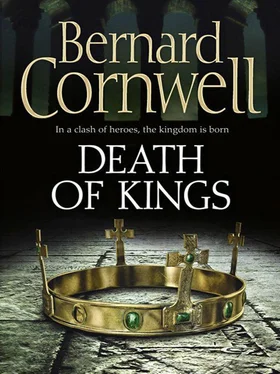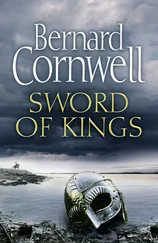‘No cattle raids?’
‘One or two,’ he shrugged. Since last I saw him he had lost the use of his legs and needed to be carried everywhere in a chair. ‘It’s old age,’ he told me. ‘I’m dying from the ground up. I suppose you want ale?’
We exchanged news in his hall. He bellowed with laughter when I told him of the attempt on my life. ‘You use sheep to defend yourself these days?’ He saw his son enter the hall and shouted at him. ‘Come and hear how the Lord Uhtred won the battle of the sheep!’
The son was called Beortsig and, like his father, was broad-shouldered and heavy-bearded. He laughed at the tale, but the laughter seemed forced. ‘You say the rogues came from Tofeceaster?’ he asked.
‘That’s what the bastard said.’
‘That’s our land,’ Beortsig said.
‘Outlaws,’ Beornnoth said dismissively.
‘And fools,’ Beortsig added.
‘A thin, bald, one-eyed man recruited them,’ I said. ‘Do you know anyone who looks like that?’
‘Sounds like our priest,’ Beornnoth said, amused. Beortsig said nothing. ‘So what brings you here?’ Beornnoth asked, ‘other than the need to drain my ale barrels?’
I told him of Alfred’s request that I seal a treaty with Eohric, and how Eohric’s envoys had explained their king’s request because of his fear of Sigurd and Cnut. Beornnoth looked sceptical. ‘Sigurd and Cnut aren’t interested in East Anglia,’ he said.
‘Eohric thinks they are.’
‘The man’s a fool,’ Beornnoth said, ‘and always was. Sigurd and Cnut want Mercia and Wessex.’
‘And once they possess those kingdoms, lord,’ Osferth spoke softly to our host, ‘they’ll want East Anglia.’
‘True, I suppose,’ Beornnoth allowed.
‘So why not take East Anglia first?’ Osferth suggested, ‘and add its men to their war-bands?’
‘Nothing will happen till Alfred dies,’ Beornnoth suggested. He made the sign of the cross, ‘and I pray he still lives.’
‘Amen,’ Osferth said.
‘So you want to disturb Sigurd’s peace?’ Beornnoth asked me.
‘I want to know what he’s doing,’ I said.
‘He’s preparing for Yule,’ Beortsig said dismissively.
‘Which means he’ll be drunk for the next month,’ the father added.
‘He’s left us in peace all year,’ the son said.
‘And I don’t want you poking his wasps out of their nest,’ Beornnoth said. He spoke lightly enough, but his meaning was heavy. If I rode on north then I might provoke Sigurd, then Beornnoth’s land would be thudded by Danish hooves and reddened by Danish blades.
‘I have to go to East Anglia,’ I explained, ‘and Sigurd’s not going to like the thought of an alliance between Eohric and Alfred. He might send men south to make his displeasure known.’
Beornnoth frowned. ‘Or he might not.’
‘Which is what I want to find out,’ I said.
Beornnoth grunted at that. ‘You’re bored, Lord Uhtred?’ he asked. ‘You want to kill a few Danes?’
‘I just want to smell them,’ I said.
‘Smell?’
‘Half Britain will already know of this treaty with Eohric,’ I said, ‘and who has the most interest in preventing it?’
‘Sigurd,’ Beornnoth admitted after a pause.
I sometimes thought of Britain as a mill. At the base, heavy and dependable was the millstone of Wessex, while at the top, just as heavy, was the grindstone of the Danes, and Mercia was crushed between them. Mercia was where Saxon and Dane fought most often. Alfred had cleverly extended his authority over much of the kingdom’s south, but the Danes were lords of its north, and till now the struggle had been fairly evenly divided, which meant both sides sought allies. The Danes had offered enticements to the Welsh kings, but though the Welsh nursed an undying hatred of all Saxons, they feared the wrath of their Christian God more than they feared the Danes, and so most of the Welsh kept an uneasy peace with Wessex. To the east, though, lay the unpredictable kingdom of East Anglia, which was ruled by Danes, but was ostensibly Christian. East Anglia could tip the scales. If Eohric sent men to fight against Wessex then the Danes would win, but if he allied himself with the Christians then the Danes would face defeat.
Sigurd, I thought, would want to prevent the treaty ever happening, and he had two weeks to do that. Had he sent the thirteen men to kill me? As I sat by Beornnoth’s fire, that seemed the best answer. And if he had, then what would he do next?
‘You want to smell him, eh?’ Beornnoth asked.
‘Not provoke him,’ I promised.
‘No deaths? No robbery?’
‘I won’t start anything,’ I promised.
‘God knows what you’ll discover without slaughtering a few of the bastards,’ Beornnoth said, ‘but yes. Go and sniff. Beortsig will go with you.’ He was sending his son and a dozen household warriors to make sure we kept our word. Beornnoth feared we planned to lay waste a few Danish steadings and bring back cattle, silver and slaves, and his men would be there to prevent that, but in truth I only wanted to smell the land.
I did not trust Sigurd or his ally, Cnut. I liked both of them, but knew they would kill me as casually as we kill our winter cattle. Sigurd was the wealthier of the two men, while Cnut the more dangerous. He was young still, and in his few years he had gained a reputation as a sword-Dane, a man whose blade was to be respected and feared. Such a man attracted others. They came from across the sea, rowing to Britain to follow a leader who promised them wealth. And in the spring, I thought, the Danes would surely come again, or perhaps they would wait till Alfred died, knowing that the death of a king brings uncertainty, and in uncertainty lies opportunity.
Beortsig was thinking the same. ‘Is Alfred really dying?’ he asked me as we rode north.
‘So everyone says.’
‘They’ve said it before.’
‘Many times,’ I agreed.
‘You believe it?’
‘I haven’t seen him for myself,’ I said, and I knew I would not be welcome in his palace even if I wanted to see him. I had been told Æthelflaed had gone to Wintanceaster for the Christmas feast, but more likely she had been summoned for the death-watch rather than for the dubious delights of her father’s table.
‘And Edward will inherit?’ Beortsig asked.
‘That’s what Alfred wants.’
‘And who becomes king in Mercia?’ he asked.
‘There is no king in Mercia,’ I said.
‘There should be,’ he said bitterly, ‘and not a West Saxon either! We’re Mercians, not West Saxons.’ I said nothing in response. There had once been kings in Mercia, but now it was subservient to Wessex. Alfred had managed that. His daughter was married to the most powerful of the Mercian ealdormen, and most Saxons in Mercia seemed content that they were effectively under Alfred’s protection, but not all Mercians liked that West Saxon dominance. When Alfred died the powerful Mercians would start eyeing their empty throne, and Beortsig, I supposed, was one such man. ‘Our forefathers were kings here,’ he told me.
‘My forefathers were kings in Northumbria,’ I retorted, ‘but I don’t want the throne.’
‘Mercia should be ruled by a Mercian,’ he said. He seemed uncomfortable in my company, or perhaps he was uneasy because we rode deep into the lands that Sigurd claimed.
We rode directly north, the low winter sun throwing our shadows far ahead of us. The first steadings we passed were nothing but burned out ruins, then after midday we came to a village. The people had seen us coming, and so I took my horsemen into the nearby woods until we had rousted a couple out of their hiding place. They were Saxons, a slave and his wife, and they said their lord was a Dane. ‘Is he in his hall?’ I asked.
Читать дальше
Конец ознакомительного отрывка
Купить книгу












